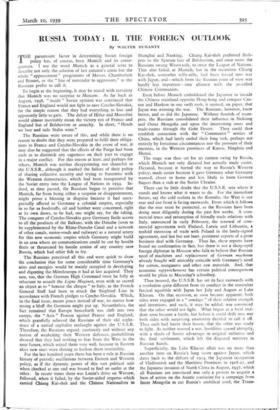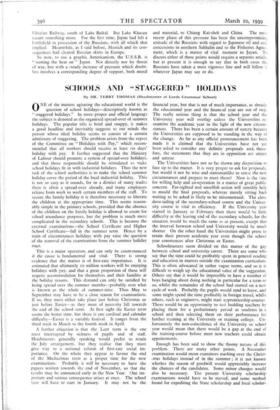RUSSIA TODAY: II. THE FOREIGN OUTLOOK
By WALTER DURANTY
THE paramount factor in determining Soviet foreign policy has, of course, been Munich and its conse- quences. I use the word Munich as a general term to describe not only the solution of last autumn's crisis but the whole " appeasement " programme of Messrs. Chamberlain and Bonnet, or the "line of surrender to aggressors," as the Russians prefer to call it.
To begin at the beginning, it may be stated with certainty that Munich was no surprise to Moscow. As far back as August, 1938, " inside " Soviet opinion was convinced that France and England would not fight to save Czecho-Slovakia, for the simple reason that they had everything to lose and apparently little to gain. The defeat of Hitler and Mussolini would almost inevitably mean the victory not of France and England but of Bolshevism or anarchy. In short, "Heads we lose and tails Stalin wins."
The Russians were aware of this, and while there is no reason to doubt that they were prepared to fulfil their obliga- tions to France and Czecho-Slovakia in the event of war, it may also be suggested that the effects of the Purge had been such as to diminish any eagerness on their part to engage in a major conflict. For this reason at least, and perhaps for others, Munich was neither disappointing nor shameful to the U.S.S.R., although it marked the failure of their policy of sharing collective security and trying to fraternise with the Western democracies, which had been inaugurated by the Soviet entry into the League of Nations in 5934. In- deed, as time passed, the Russians began to perceive that Munich, far from being either a surprise or disappointment, might prove a blessing in disguise because it had unex- pectedly offered to Germany a colonial empire, especially in so far as foodstuffs, oil and lumber were concerned, right at its own doors, to be had, one might say, for the taking. The conquest of Czecho-Slovakia gave Germany facile access to all the products of the Balkans, with the Danube (soon to be supplemented by the Rhine-Danube Canal and a network of other canals, motor-roads and railways) as a natural artery for this new economic empire which Germany might build in an area where no communications could be cut by hostile fleets or threatened by hostile armies of any country save Russia, which had other fish to fry.
The Russians perceived all this and were quick to draw the conclusion that for some considerable time Germany's aims and energies would be mainly occupied in developing and digesting the Mitteleuropa it had at last acquired. They saw, too, that the German High Command must be fully as reluctant to assault the Ligne Maginot, even with so sacred an object as to "honour the cheque" to Italy, as the French General Staff had been to attack the Siegfried Line in accordance with French pledges to Czec.ho-Slovakia. Which, in the final issue, meant peace instead of war, no matter how strong a bluff the Germans might put up. Nevertheless, the fact remained that Europe henceforth was cleft into two camps, the " Axis " Powers against France and England, which gratefully relieved the Russians of their old night- mare of a united capitalist onslaught against the U.S.S.R. Therefore, the Russians argued, cautiously and without any notion of weakening their Western defences, probabilities showed that they had nothing to fear from the West in the near future, which suited them very well, because in Eastern skies new stars were shining to beckon them irresistibly.
For the last hundred years there has been a rule in Russian history of periodic oscillations between Eastern and Western Policy, as if the dynamic power of this vast political unit when checked at one end was bound to find an outlet at the other. In recent times there was Lenin's drive on Warsaw, followed, when it failed, by the Soviet-aided impetus which carried Chiang Kai-shek and the Chinese Nationalists to Shanghai and Nanking. Chiang Kai-shek preferred flesh- pots to the Spartan fare of Bolshevism, and once more the Russians swung Westwards, to enter the League of Nations. That also failed, at Munich, but in the meantime Chiang Kai-shek, somewhat willy-nilly, had been forced into war with Japan, and—which from the Russian point of view was hardly less important—into alliance with the so-called Chinese Communists.
Even before Munich emboldened the Japanese to invade the Chinese mainland opposite Hong-kong and conquer Can- ton and Hankow in one swift rush, it seemed, on paper, that Japan was winning the war. The Russians, however, knew better, and so did the Japanese. Without flourish of trum- pets, the Russians consolidated their influence in Sinkiang and Outer Mongolia and upon the intervening oases and trade-routes through the Gobi Desert. They could thus establish connexion with the " Communist " armies of China, which had lately ended their long trek, perhaps not entirely by fortuitous circumstances nor the pressure of their enemies, in the Western provinces of Kansu, Ninghsia and Shensi.
The stage was thus set for an eastern swing by Russia, which Munich not only dictated but actually made easier. Dictated, because it barred the way to Russia's Western policy; made easier because it gave Germany what Germany wanted, closer to home and less likely to burn German fingers than a stab at the Soviet Ukraine.
There can be little doubt that the U.S.S.R. sees where it stands and knows what it wants to do. For the immediate future, say the cold realists in the Kremlin, the West is our rear and our front is facing eastwards. From which it follows that the rear must be protected, as the Russians have been doing most diligently during the past few weeks. A com- mercial truce and resumption of friendly trade relations with Italy, announced in early February, the renewal of com- mercial agreements with Finland, Latvia and Lithuania, a tenfold extension of trade with Poland in the lately-signed agreement, and last but not least, persistent reports of a great business deal with Germany. Thus far, these reports have found no confirmation in fact, but there is not a sharp-eyed foreign diplomat in Moscow who fails to believe that Russian need of machines and replacement of German machines already bought will amicably coincide with Germany's need for cotton, manganese and other raw materials. And, that economic rapprochement has certain political consequences would be plain to Macaulay's schoolboy.
Thus insured, the U.S.S.R. has set its face eastwards with a resolution quite different from its conduct in the somewhat farcical squabble with Japan last July and August at Lake Khasan. On that occasion, as soon became apparent, both sides were engaged in a " sondage " of their relative strength and intentions, and each, it may be added, was convinced that the other would not fight. What began as a local inci- dent soon became a battle, but before it could drift into war both sides with surprising unanimity decided to call it off. They each had learnt their lesson, that the other was ready to fight. As neither wanted a war, hostilities ceased abruptly, with a shade of Soviet advantage in original initiative and the final settlement, which left the disputed territory in Russian hands.
Superficially, the Lake Khasan affair was no more than another item on Russia's long score against Japan, which dates back to the defeats of 1904, the Japanese occupation of Vladivostok and the Maritime Provinces in 1918-21, and the Japanese invasion of North China in August, 1937, which all Russians are convinced was only a pretext to acquire a base of action on the Asiatic continent for a campaign from Inner Mongolia to cut Russia's umbilical cord, the Trans- Siberian Railway, south of Lake Baikal. But Lake Khasan meant something more. For the first time, Japan had left a battlefield in possession of the Russians, with all which that implied. Meanwhile, as I said before, Munich and its con- sequences had cleared Russian skirts in Europe.
So now, to use a graphic Americanism, the U.S.S.R. is "turning the heat on" Japan. Not directly nor by threat of war, but with a steady increase of pressure which doubt- less involves a corresponding degree of support, both moral and material, to Chiang Kai-shek and China. The most recent phase of this pressure has been the uncompromising attitude of the Russians with regard to Japanese oil and coal concessions in northern Sakhalin and to the Fisheries Agree- ment, which is a matter of vital moment to Japan. To discuss either of these points would require a separate article, but at present it is enough to say that in both cases the Russians have taken a most vigorous line and will follow it whatever Japan may say or do.











































 Previous page
Previous page